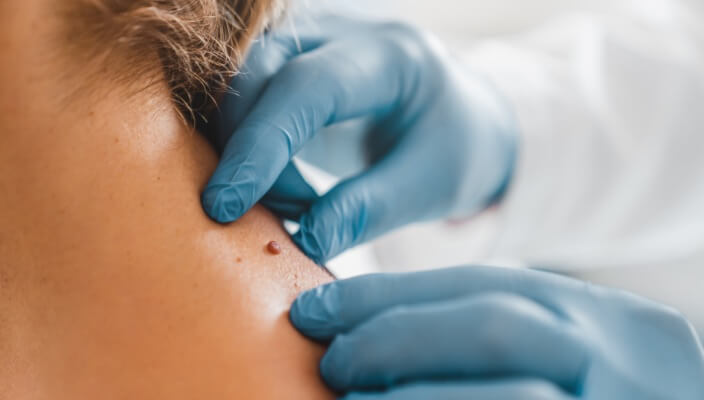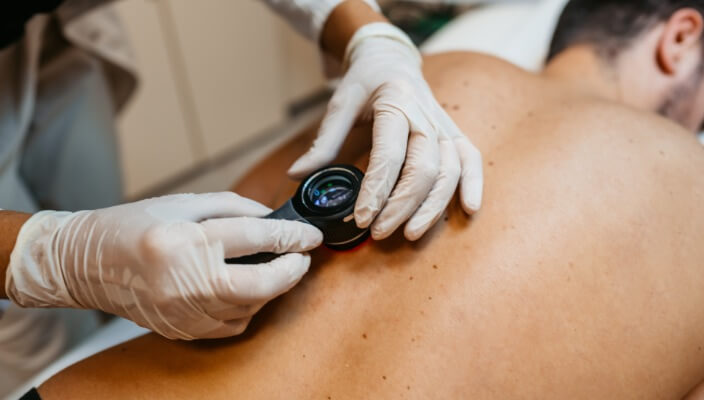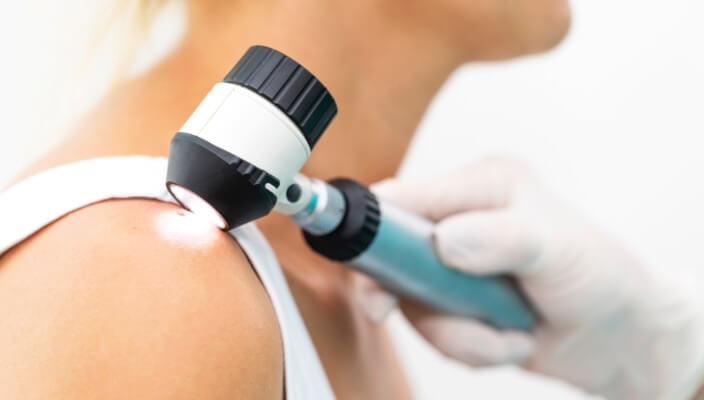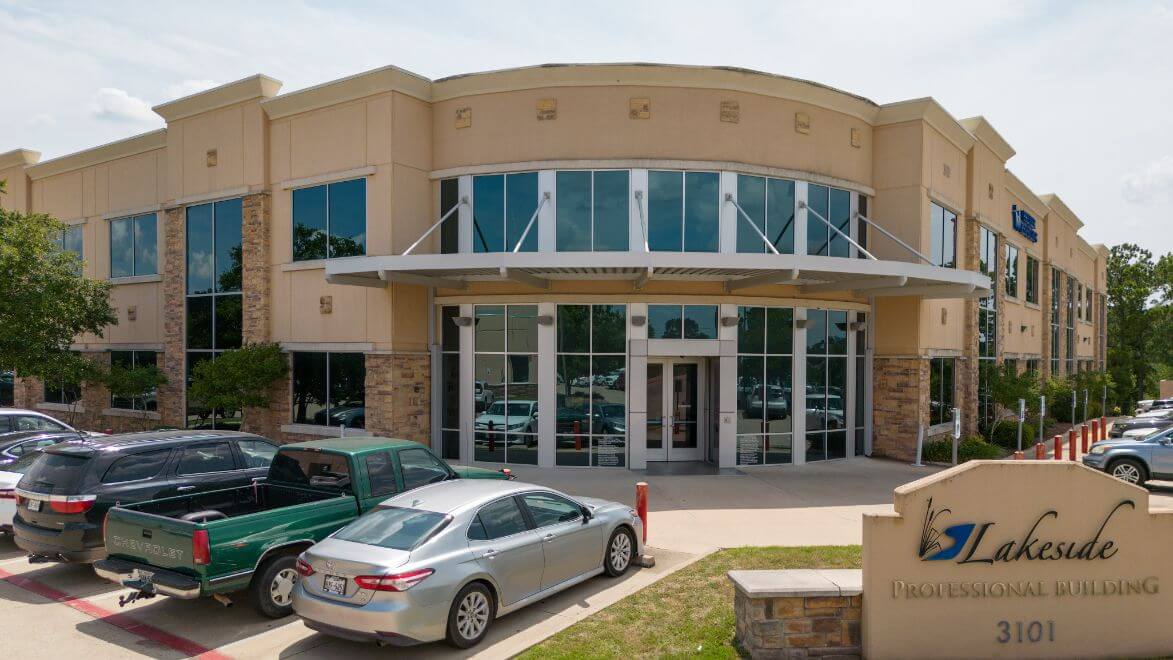The Importance of Early Detection in Skin Cancer Treatment
Improve Your Prognosis with Early Skin Cancer Detection
 Texas is one of the sunniest states in the country. While the sun is vital for overall health, prolonged exposure without adequate protection can lead to skin cancer. Early diagnosis is critical for positive patient outcomes. At Tru-Skin Dermatology, we offer patients free cancer screenings and comprehensive and customizable skin cancer treatments at our Austin, Bastrop, Spring Branch, Hallettsville, La Grange, and Round Rock, TX clinics. Our team has access to the latest skin cancer treatment technology to quickly remove certain kinds of skin cancer. Learn more about the life-saving potential of early skin cancer detection, and then contact us to schedule your free screening.
Texas is one of the sunniest states in the country. While the sun is vital for overall health, prolonged exposure without adequate protection can lead to skin cancer. Early diagnosis is critical for positive patient outcomes. At Tru-Skin Dermatology, we offer patients free cancer screenings and comprehensive and customizable skin cancer treatments at our Austin, Bastrop, Spring Branch, Hallettsville, La Grange, and Round Rock, TX clinics. Our team has access to the latest skin cancer treatment technology to quickly remove certain kinds of skin cancer. Learn more about the life-saving potential of early skin cancer detection, and then contact us to schedule your free screening.
Learn More About Skin Cancer
Skin cancer is one of the most common forms of cancer, not only in the United States but across the globe. Damaged DNA causes the skin cells to multiply rapidly, leading to an abnormal growth or tumor. There are two different types of tumors. A malignant tumor is a cancer that spreads to other parts of the body. If left untreated, a benign tumor may increase in size but will not spread to other body parts. Getting any abnormal growths on your skin checked out by a dermatologist is critical. Some of the most common types of skin cancer include:
What Are Some of the Risk Factors Attributed to Skin Cancer?
While skin cancer is widespread, the risk factors often associated with it are well known. It is crucial each patient takes the necessary precautions to reduce their chance of developing skin cancer. Understanding the risk factors and tailoring a prevention plan, such as wearing sunscreen, avoiding tanning beds, and seeking shade during peak daytime hours, is crucial for your long-term health. Learn more about some of the common risk factors of cancer, including the following:
UV Exposure: The most common cause of skin cancer is UV rays from the sun as well as tanning beds. Ultraviolet rays can cause damage to your skin, often in the form of sunburns. Over time, repeated damage can eventually lead to mutations in the form of cancer.
Genetics: If your family has a history of developing skin cancer, it becomes increasingly important you protect yourself. Individuals with a family history of skin cancer are more susceptible to developing the disease.
Skin Type: Melanin helps protect the skin from dangerous UV rays. However, individuals with light skin, hair, and eyes that contain less pigmentation are more likely to develop skin cancer.
Age: While skin cancer can occur at any age, older individuals have a higher prevalence due to accumulated UV exposure over time.
Educating yourself about these risk factors allows you and others to take a proactive stance against this pervasive disease.
Early detection of skin cancer is critical since it can significantly increase the chances of successful treatment.
The Impact of Early Detection
Early detection of skin cancer is critical since it can significantly increase the chances of successful treatment and reduce the severity of interventions. When identified at an early stage, skin cancer is often more responsive to less aggressive treatments, which can minimize both the physical and emotional impact on patients. Early detection increases the survival rates, especially for melanoma, which can be extremely aggressive. When caught before it spreads, the five-year survival rate for melanoma is 99%. However, the survival rate drops dramatically once it metastasizes to other organs.
What Are Some Early Warning Signs of Skin Cancer?
While visiting a dermatologist is essential for diagnosis and treatment, it is up to each patient to know the common signs of skin cancer so they can conduct an at-home screening. Knowledge of the common symptoms, routine self-examination, and regular professional screenings can improve your prognosis if skin cancer is discovered. Remember, skin cancer is most treatable during its earliest stages. Some of the most common signs of skin cancer include the following:
- Open Sores That Heal and Reopen
- Red Patches or Irritated Areas
- Scaly, Red Patches That Crust or Bleed
- Firm, Wart-Like, or Elevated Growths
- Large Brownish Spot with Dark Areas
- Mole That Changes in Color, Size, or Texture
Dr. Daniel Ladd Discusses IGSRT Skin Cancer Treatment
Tru-Skin Dermatology: Trusted for Skin Cancer Diagnosis & Treatment
Prevention, early detection, and innovative treatment options are critical for ensuring positive outcomes for our patients. At Tru-Skin Dermatology, we know the diagnosis and treatment phases can be an emotionally and physically difficult time for you and your family. Our skilled and experienced dermatologists offer innovative skin cancer treatments, including the SRT-100 Vision™, at our comfortable clinics throughout Texas, including Austin, Bastrop, Spring Branch, Hallettsville, La Grange, and Round Rock. If you are concerned about an unusual sore or growth on your skin, our team will be there for you to provide appropriate treatments and peace of mind. We offer free skin cancer screenings for the community, even members who don’t have health insurance. Book your next appointment today.
Featured Sunscreens

Bright+Block SPF 44 Tinted Mineral Sunscreen for Face
Bright+Block SPF 44 tinted mineral sunscreen is water-resistant (40 minutes) and provides a lightweight, sheer universal tint that flatters most skin tones. This sunscreen is suitable for dry, normal or sensitive skin and is light enough to wear alone or under makeup for daily sun protection. Broad-spectrum UVA & UVB coverage is achieved through chemical-free active ingredients: Zinc oxide and Titanium Dioxide. 2.1 OZ (59 G)

SkinMedica Total Defense & Repair Broad Spectrum Sunscreen
Revolutionary non-tinted superscreen goes beyond UV protection to defend against harmful infrared rays while supporting the skin’s ability to restore itself. Appropriate for all skin types. 65 g / 2.3 oz
Related Blogs

- Skin Cancer
- General Dermatology
- Skin Exams
- Sun Safety
- Skin Care
Texans have an increased risk of skin conditions due to the fluctuating climatic conditions. Therefore, Tru-Skin Dermatology provides our Texas patients with regular check-ups for their skincare.
Read More
- Skin Cancer
Image-guided superficial radiation therapy (IG-SRT) is a non-surgical treatment option for non-melanoma skin cancers. Learn about this treatment offered at Tru-Skin Dermatology.
Read More
- Skin Cancer
- Skin Exams
Skin cancer remains a critical public health issue across the globe, and Texas, with its vast landscapes and relentless sunshine, is no exception.
Read More


